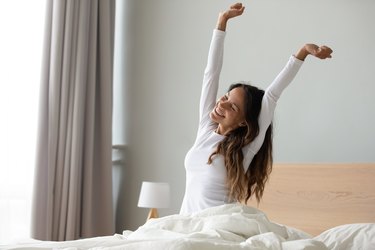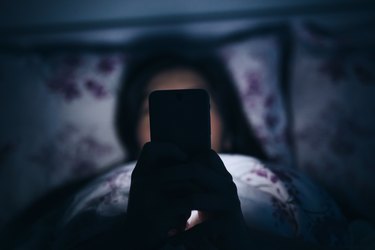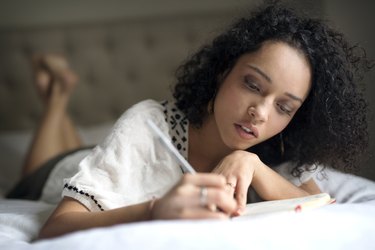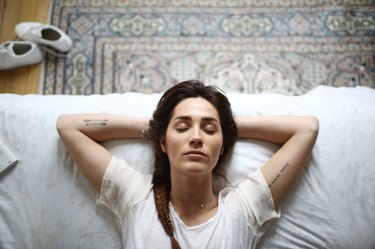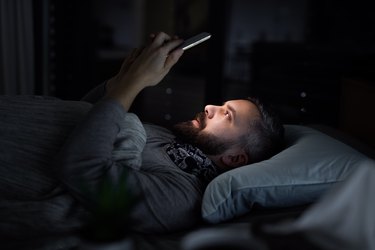
We're all familiar with the recommendations to steer clear of screens before bed in the name of better sleep. But what if you just switch your device to dark mode?
Dark mode is often touted as a way to reduce your exposure to sleep-disrupting blue light to encourage a better night's sleep. And some say, too, that it can reduce the strain on your eyes and make using your device more comfortable.
Video of the Day
Video of the Day
But while it may be helpful, it's not necessarily a cure-all. Here's what to know.
What Is Blue Light, Exactly?
Blue light is a type of light on the visible light spectrum with the highest energy and the shortest wavelength. We're exposed to it via artificial sources like cell phones, tablets and computers, along with flat-screen LED televisions and even compact fluorescent (CFL) light bulbs, according to the University of California Davis.
But blue light isn't a purely artificial phenomenon. "We also get blue light all the time just from sunlight," says Barrett Eubanks, MD, a Murrieta, California-based ophthalmologist.
How Does Blue Light Affect Sleep and Eye Health?
Blue light exposure, whether from an artificial source or the sun, is known to boost alertness (as well as mood). "It suppresses the body's production of melatonin, a hormone that increases at night to help you fall asleep," explains Thomas Bradley Raper, MD, a sleep medicine specialist with Texas Health Presbyterian Hospital Dallas. When that happens, the body's circadian rhythm or internal clock can become disrupted, making it harder to fall asleep.
There's no evidence that blue light exposure will damage your eyes or increase the risk for long-term eye problems like age-related macular degeneration, according to the American Academy of Ophthalmology (AAO).
But spending too much time in front of electronic devices that emit blue light can strain your eyes and make them uncomfortable. This can lead to computer vision syndrome, a condition marked by watery or dry eyes, blurred vision, burning or itchiness, light sensitivity or trouble keeping the eyes open, per the Cleveland Clinic.
The blue light coming from the screen isn't the culprit exactly, though. According to the AAO, it's how we use our electronic devices — rather than just the exposure to blue light — that's to blame. "One reason is due to an increase in dry eyes, as we blink less when using a computer," Dr. Eubanks says. "Another cause is due to increased time focusing on up-close objects, which work the focusing muscles in our eye."
Using screen-based devices in the dark can be particularly irritating. "If you've ever been in a dark environment when someone suddenly turned the light on with no warning, you know exactly how uncomfortable that can be. It can be very jarring to see large amounts of bright light in a dim or dark setting," Dr. Eubanks says.
So, Is Dark Mode Better for You?
Dark mode has been touted as a way to reduce exposure to blue light while using electronic devices, and in turn, potentially promote better sleep and minimize eye strain. "With Apple phones, for example, there's a 'night shift mode' that shifts the display to warmer colors at night," Dr. Eubanks says.
So far, the science doesn't support claims that dark mode improves sleep. Apple iPad users who used Night Shift (the brand's name for dark mode) didn't experience a difference in melatonin production compared to those who didn't use Night Shift, found a May 2019 study in Lighting Research & Technology.
It remains to be seen whether blue-light blocking glasses, essentially a wearable version of dark mode, can prevent digital eyestrain either, per a January 2020 study in Work.
That's not to say that turning down the brightness on your devices isn't helpful. It is — but the benefit seems to come largely from reducing light exposure as a whole rather than just reducing exposure to blue light. "Any light will have an effect on our circadian rhythm, it just happens that blue light has the greatest impact," Dr. Eubanks says.
To promote a healthy sleep-wake cycle, experts like Dr. Raper recommend keeping your screen dim in the evening. "If you can dim the brightness of your device, you will decrease the amount of blue light, and it may reduce the risk of insomnia," he says.
If you can avoid bright lights by not using your device for 30 to 60 minutes before bedtime altogether, even better, the Cleveland Clinic notes.
More Tips to Protect Your Eyes
Reducing your use of screen-based devices before bed can limit your exposure to stimulating bright light (blue or otherwise) and improve your chances of getting a good night's sleep. But what about easing device-related eye strain during the day?
If you're experiencing symptoms of computer vision syndrome or want to prevent them, dimming your screen's brightness as well as using a matte screen filter to reduce glare can be helpful, the AAO says. But you'll reap the biggest benefits by taking other measures too, including the following:
- Take screen breaks every 20 minutes
- Use artificial tears when your eyes feel dry
- Try to sit at least an arm's length away from your screen with the height angled so the screen faces slightly downward
Finally, if you're a contact user, consider switching to glasses when you'll be in front of the screen for long stretches. Contacts increase eye dryness and irritation, which can exacerbate computer vision syndrome symptoms, per the AAO.
Related Reading
- University of California Davis: "Is blue light from your cell phone, TV bad for your health?"
- American Academy of Ophthalmology: "Digital Devices and Your Eyes"
- Cleveland Clinic: "Do Blue Light Glasses Work?"
- Lighting Research & Technology: "Does the iPad Night Shift mode reduce melatonin suppression?"
- Work: "A double-blind test of blue-blocking filters on symptoms of digital eye strain"
- Cleveland Clinic: "Put the Phone Away! 3 Reasons Why Looking at It Before Bed Is a Bad Habit"
Is this an emergency? If you are experiencing serious medical symptoms, please see the National Library of Medicine’s list of signs you need emergency medical attention or call 911.
